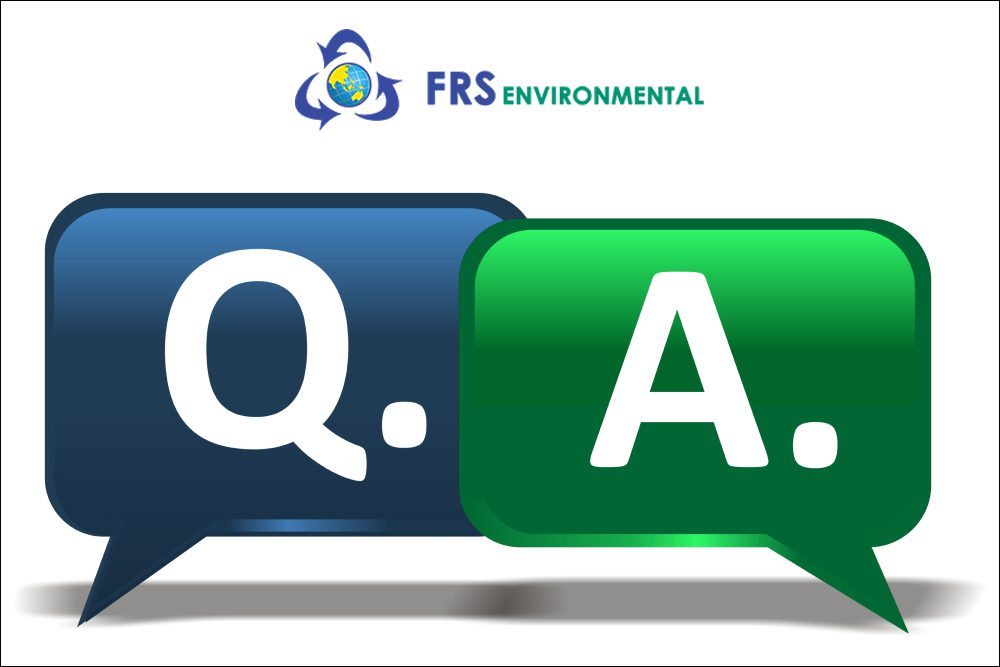Hazardous Waste: Your Questions Answered

By FRS Environmental, Inc. — California’s Hazardous Waste Management Experts
Proper hazardous waste management isn’t just about staying compliant — it’s about protecting your employees, your community, and the environment.
At FRS Environmental, Inc., we’ve spent over 25 years helping California businesses manage hazardous, universal, and non-hazardous waste safely and responsibly.
Below, our experts answer some of the most common questions about hazardous waste handling, storage, and disposal.
What is considered hazardous waste?
Hazardous waste is any waste that poses a potential risk to people or the environment. According to the EPA (Environmental Protection Agency), hazardous waste can be flammable, corrosive, reactive, or toxic.
Common examples include:
– Used solvents and paint thinners
– Corrosive cleaners and acids
– Batteries and fluorescent light bulbs
– Contaminated rags, absorbents, or soil
– Electronic waste (e-waste) with heavy metals
FRS Environmental helps businesses identify, classify, and manage hazardous materials safely and in full compliance with DTSC and CalEPA regulations.
Who regulates hazardous waste in California?
In the U.S., hazardous waste is regulated under the Resource Conservation and Recovery Act (RCRA) by the EPA.
In California, the Department of Toxic Substances Control (DTSC) and CalEPA enforce stricter hazardous waste rules and reporting requirements.
FRS Environmental works directly within these regulations to ensure every waste stream is stored, transported, and disposed of properly — protecting your business from fines and liability.
What are the four main characteristics of hazardous waste?
Hazardous waste is identified by four key characteristics:
1. Ignitability – Easily catches fire (e.g., fuels, alcohols, solvents)
2. Corrosivity – Eats through metals or tissue (e.g., acids, bases)
3. Reactivity – Can explode or release toxic gases (e.g., peroxides, cyanides)
4. Toxicity – Harmful when ingested or absorbed (e.g., heavy metals, lead, mercury)
Our team at FRS Environmental, Inc. performs waste profiling, sampling, and lab analysis to determine the correct classification for your materials.
How should hazardous waste be stored?
Hazardous waste must be stored in approved, labeled, and sealed containers that are compatible with the materials inside.
Best practices include:
– Keep containers closed when not in use
– Store in a secure, designated area away from drains and traffic
– Use secondary containment (spill pallets, berms)
– Label containers with “Hazardous Waste” and the accumulation start date
FRS Environmental can help you set up compliant storage areas, provide proper labeling, and conduct site audits to prepare for DTSC inspections.
What is the difference between hazardous and universal waste?
Universal waste is a simplified category of hazardous waste that’s more common and widely generated. Examples include:
– Batteries (lithium, lead-acid, nickel-cadmium)
– Fluorescent lamps and bulbs
– Electronic waste (e-waste)
– Mercury-containing devices (thermostats, switches)
FRS Environmental offers universal waste collection and recycling programs that are fast, compliant, and cost-effective.
How often should hazardous waste be picked up?
Pickup frequency depends on your generator status under DTSC and EPA rules:
– Large Quantity Generators (LQGs): >1,000 kg/month — must ship every 90 days
– Small Quantity Generators (SQGs): 100–1,000 kg/month — must ship every 180 days
– Very Small Quantity Generators (VSQGs): <100 kg/month — may ship as needed
FRS Environmental manages scheduled waste pickups, manifests, and documentation so your facility stays compliant year-round.
Can hazardous waste be recycled?
Absolutely. Many types of hazardous waste can be recycled, reclaimed, or reused, including:
– Solvents and oils
– Metals and batteries
– Electronic waste components
FRS Environmental partners with certified recycling and treatment facilities to minimize landfill waste and reduce your environmental footprint — while lowering disposal costs.
What happens if hazardous waste isn’t handled correctly?
Improper hazardous waste management can lead to:
– Fines and penalties from DTSC, EPA, or CalEPA
– Soil and groundwater contamination
– Employee health and safety risks
– Damage to your company’s reputation
Working with FRS Environmental ensures every material is transported, treated, and documented according to federal and state law.
How can my business stay compliant?
To maintain compliance and safety:
– Train employees on hazardous waste handling and identification
– Label and store all containers correctly
– Maintain up-to-date waste manifests and records
– Work only with licensed transporters and disposal facilities
– Schedule regular environmental compliance audits
FRS Environmental, Inc. offers complete hazardous waste management programs — from waste profiling and labeling to pickup, transportation, and final disposal.
Why Choose FRS Environmental, Inc.?
For over 25 years, FRS Environmental, Inc. has provided hazardous waste, non-hazardous waste, universal waste, and e-waste management across California.
We specialize in:
– Hazardous waste disposal and transportation
– Universal waste collection and recycling
– Facility cleanups and waste consolidation
– DTSC and EPA compliance support
– Emergency response and on-site services
Our certified team ensures your waste is handled safely, legally, and responsibly — from start to finish.
Contact FRS Environmental Today
Let our experts help you manage your waste safely and stay compliant with California’s environmental regulations.
Serving all of California
Phone: 951-898-1888
Website: www.frsenvironmental.com
Email: office@frsenvironmental.com
